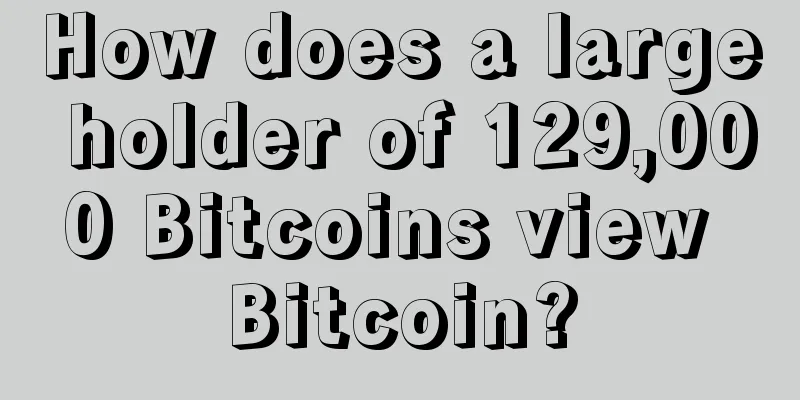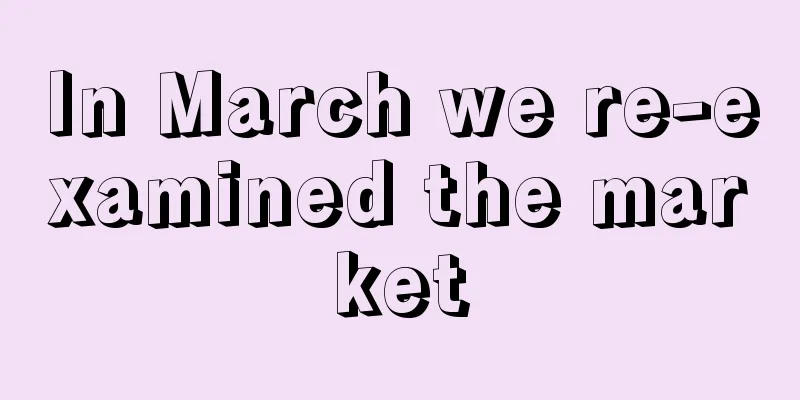How does a large holder of 129,000 Bitcoins view Bitcoin?

|
A few days ago, Michael Saylor, founder and CEO of Microstrategy, accepted a video interview with Cathy Merrill, CEO of Washingtonian, to talk about his views and opinions on Bitcoin. There are some interesting questions and answers, which are excerpted and commented on below for readers. As of the time of the interview, Microstrategy had purchased 129,000 Bitcoins, one of the largest amounts owned by a single entity. Cathy asked, is Bitcoin a commodity or a currency? Saylor replied that he thinks it is best to think of Bitcoin as digital property. Alternatively, it can be seen as the world's first digital commodity. He introduced: "The idea behind Bitcoin is to create perfect money, or another way to think about it is to create perfect gold. If I can reduce the entire supply of gold to 21 million gold coins, and then if I can dematerialize them, make them weightless, and magically I can move them at the speed of light, compose and decompose them. If I can break them into 100 million little elements, which we call "satoshis", and then I can store them in cyberspace. If I can find a reliable software program to keep track of who owns these 21 million virtual coins, then you have Bitcoin. The concept of Bitcoin is that we put money in cyberspace, we make computers responsible, we make software programs responsible, and then we distribute the software program and let it run on thousands of different computers, and each computer has the same program and the same ledger, so that no one can cheat anyone, and any damaged node will be removed from the network. So it is a living organism distributed in cyberspace. The purpose is to create a shared, unchangeable ledger that records who owns what." “You can’t mine this gold anymore, it’s capped at 21 million, and you don’t have to worry about some central bank or custodian selling your gold to someone else without you knowing, and nobody can take it. Ownership of Bitcoin is achieved by owning a private key. You can theoretically hold as many Bitcoins as you want. If you hand over your private key to someone else on the network, then ownership transfers from you to them. So for the first time we have immortal money that can move at the speed of light and can be programmed on a computer. It’s a great idea.” Saylor's statement about the division into "satoshis" is still a metaphor. In fact, the entities divided into Bitcoin are electronic coins, and each coin has a face value. The face value is an integer, and the smallest is one hundred millionth of a Bitcoin, which is 1 satoshi. Can Satoshi be divided? For the Bitcoin mainnet, it requires a code upgrade. However, we can immediately move to the second-layer Lightning Network, where it can be further divided into units smaller than Satoshi. In theory, Bitcoin can be infinitely subdivided. If it can be infinitely subdivided without affecting its nature as a currency, there will be no so-called deflation problem due to insufficient money. The two properties of "moving at the speed of light" and "immortality" are particularly brilliant explanations proposed by Saylor. Cathy asked another very classic question, which is the question I have written many times about why Bitcoin cannot be copied. Interested readers can first review the three previous articles on Liu Jiaolian’s WeChat official account. One is “The Ship of Theseus: Why can we copy everything about Bitcoin but not Bitcoin?” on January 25, 2021. The second is “Bitcoin: The End of Currency” on February 7, 2021. The third is “Bitcoin is Not Scarce” on April 6, 2022. This question is also one of the two major issues about Bitcoin that Ray Dalio, the founder of Bridgewater Associates and a well-known Wall Street financier, is most concerned about. So, how does Saylor answer this question? This is his response: “Bitcoin is the world’s first designed monetary system. The protocol is designed to do one very good thing, which is to track who owns everything forever without being broken in a secure way. Other cryptocurrencies, some pursue similar things, but many pursue other goals. They want to be cryptocurrency platforms for building smart contracts or issuing NFTs, or they want to run decentralized exchanges. These are different tasks, and they usually have a lot of complex code and different types of code.” “So Bitcoin was designed to be the base layer of the entire economy, the monetary network. What’s unique about it is that it’s been replicated hundreds and thousands of times. There have been 20,000 different cryptocurrencies launched. The question is which one is best suited to be the fundamental technical and ethical base layer of the network economy. You don’t know for 12 years. You only know after you’ve attacked it 25,000 times and replicated it 25,000 times that they all fail, or they’re all different. If I put rabbits in Australia, they’re going to fill this niche in the ecosystem, which is small furry mammals. Is that feasible? You don’t know, but a hundred years from now, if the rabbits dominate that niche, then they own that niche, they occupy that part of the food chain. So Bitcoin today is the winner of this global struggle that will see the world’s dominant digital currency asset. It’s unique in that it’s the most powerful, it has the most energy, it’s the most powerful network, it has the most capital, it has the most support, it’s the most powerful protocol, it’s the most unbreakable, it’s the longest tested, the most indestructible, and of course the most widely known. It’s like the Coca-Cola of digital currencies, so you have the most powerful brand.” "I think Bitcoin is unique. I mean, Bitcoin is property. It's like buying a block of Manhattan on the internet. There are a million people who want to build other cities. But it's not Manhattan. So the risk of holding something else is orders of magnitude higher. The returns are orders of magnitude lower. I think of other cryptocurrencies as being like investing in small startups, right? Like my cousin has an idea for a mobile app to compete with Instagram. There are about 100,000 mobile apps launched, 99.9% of them fail, and one of them is going to be WhatsApp or Instagram and Snapchat. So you might get a Snapchat, but you might also get a loser." “And, this is different from investing in Apple stock, which is like owning a composite index of all mobile features. So Bitcoin is a safe haven asset in this space. Everything else is a risk asset with more safety risks. You have to analyze it, there’s more competition, there’s more complexity, there’s more regulatory risk. If you’re an expert like a venture capitalist who wants to spend all your time analyzing this space, maybe you can invest in this space. But if an average person says, “I’m 60 years old and I want to retire. How should I allocate my assets?” If you want to own digital assets, and Bitcoin is a hedge against digital asset risks, then own some. I’m not going to tell you to invest in small startups.” “… speculation, meme coins, meme stocks, or betting on horses are all very dangerous. And of course one of the things that needs to be said is that the problem with having a million dollars in cash in the bank is that for 100 years it lost 7% of its value every year, but now it’s losing 14% to 21% of its value. So in an inflationary environment, you’re guaranteed to lose 90% of your bank deposit in ten years. So there’s an inherent risk, a ticking time bomb. That’s what drives you to say, “Well, I’ve got to put it in real estate, or I’ve got to put it in investments, or I’ve got to go gamble.” “Bitcoin is the first asset where you can simply convert a million in currency into a million dollars in bitcoin. And then because you can’t make more bitcoins, the price of bitcoin appreciates with the rate of inflation, it appreciates with the rate of adoption, it appreciates with the technology. So people who buy Bitcoin say, ‘I don’t want to gamble on the market, I don’t want to gamble on meme coins. I’m tired of my estate being taxed to death. The government has seized all my property through taxes and sanctions. So what I want is property in cyberspace that nobody can take from me. I’ll hold on to it forever.’” Therefore, in Saylor's view, the uniqueness of Bitcoin lies in that it seizes and monopolizes an important ecological niche, rather than competing with other cryptocurrencies. In essence, Bitcoin is a safe-haven asset, while other cryptocurrencies are risky assets. In addition, compared to fiat currency, which is continuously over-issued and depreciated, and can be sanctioned and confiscated by powerful governments for various "noble" reasons, Bitcoin is also a safe-haven asset. Later, Cathy asked a question about whether Bitcoin could help improve human rights in underdeveloped countries and regions such as Africa. Saylor responded that there is no doubt that enabling Africans who previously did not have access to bank accounts to conveniently use Bitcoin with a smartphone is a form of financial inclusion that promotes human rights. “If I give someone in Africa $10,000 and they have to convert it into local currency, that $10,000 is going to be worth $500 in a few years,” he said. “The bank won’t even give you an account. There are 3 billion people who can’t have a bank account even if they have money. But if they did, Africans would be less likely to buy a diversified portfolio. So if you had money, what would you want to own in Africa that you would consider higher quality than a house in Maryland or Virginia?” “What do you want to own? Nothing, right? So you can’t buy anything. If I’m one of the 3 or 4 billion people in these countries and I can’t trust the currency, I can’t trust the government, I can’t trust my neighbors and my banks, how do I actually preserve my economic wealth? The answer is, I download an app on my Android phone, put some digital dollars like stablecoins, some Bitcoin, some digital property on it, and don’t tell anybody I own it. If I need to flee the country, I can take it with me. If they’re going to confiscate my phone, I can just memorize 12 words and walk out of the country and I’ve preserved my wealth.” “If I live in the US and my lover is in Nigeria and I want to send them money the traditional way, it takes weeks, it costs 10% in fees, and when they go to the bank to withdraw the money, they get robbed. On the other hand, I can put money into a lightning wallet on a Sunday afternoon and send it to them in 30 seconds, with no friction. I exclude banks, I exclude robbers, bad currency, and money changers. If you live anywhere in the developing world, you can lose 10% of your money in remittances. And then you lose 20% to 30% every year to inflation. So it’s a human rights issue. People who like Bitcoin believe that this is a tool to economically empower billions of people whose lives are hopeless without this technology.” Of course, it is worth mentioning that before this, it was my country, the infrastructure maniac, that sent affordable wireless networks and smartphone equipment to African countries. Cathy also asked about the environmental protection and energy consumption of Bitcoin mining. In response, Saylor decisively replied that Bitcoin mining is the cleanest industry in the world. "That's actually what makes it immortal and indestructible," he said. "The process of mining Bitcoin is taking raw electricity and then encrypting it with the SHA-256 algorithm. So it's encrypted energy. You're converting that energy digitally with a semiconductor chip, which we call a Bitcoin miner. And traditionally the largest hardware manufacturers have been Chinese companies like Bitmain. But Intel just announced last week that they're going to make Bitcoin miners and a new Bitcoin mining chip. The way this network works is, I buy a Bitcoin miner, I put it in a data center, I power it. It builds a wall of encrypted energy that protects your assets from malicious attacks by hackers, nation states, or malicious actors. If you don't do that, then someone could come up with a piece of code that hacks into the system and steals all those hundreds of billions of dollars. If they do that once, it's the end of the world." “The most important thing about mining is that it’s the cleanest, most efficient use of energy in the world. I mean, it’s the cleanest industry in the world. A lot of people don’t realize that. If you think about it, you realize… Bitcoin mining uses 14 basis points of the world’s energy. So one-tenth of 1% of the world’s energy is Bitcoin mining. That’s really insignificant. Secondly, it’s going to go down. It’s heading towards one-hundredth of 1% because semiconductor technology has made orders of magnitude advances.” “… the industry itself is an industry of technology that is becoming exponentially more efficient. If you look at electricity, 58% of the electricity that’s used is already sustainable, which means that’s cleaner than your Tesla’s electricity, cleaner than all the energy used by planes, trains, cars, buildings, food, hospitals, defense, banks. Everything else in the world uses dirtier, more energy. So if you’re a real environmentalist, 99.95% of carbon emissions come from things other than Bitcoin, and Bitcoin’s energy efficiency is improving by 36% every year.” “So it’s not the problem nor the solution to any environmental problem. It’s an industry that uses crypto energy to create open permissionless crypto assets that are technically ethical.” “If you want to create a non-security, if you want to create a property, it has to be permissionless. The only way we’ve ever solved this problem in the history of the world is proof-of-work mining, which is the Bitcoin mining network. So it doesn’t create a carbon emission problem, it’s not even a big energy consumer, it’s just a very efficient use of energy because you’re putting about $2 billion worth of electricity into a network that creates $800 billion in value. If you compare that energy efficiency to $2 billion put into the airplane business, you realize that it costs 1,000 times more to fly airplanes around and extract value from them than it does to track or secure digital assets.” The idea that Bitcoin is crypto energy is interesting. In addition, Cathy also asked about NFT. Saylor believes that if you buy NFTs for the purpose of long-term investment, then the gambling element is very large. "Even so, suppose you buy all the works of Picasso or Leonardo da Vinci, you are betting that humans will still value 19th-century Impressionist paintings in 1,000 years, right? If this is your bet, it is risky. But I think that 1,000 years from now, humans are more likely to value pure energy or currency than 19th-century Impressionist painters. They will have a place, but there will be other art that can be created, which will dilute these arts and cultures. So you are taking a risk, you are expressing an emotion." They also discussed some other issues, which we will not go into here. I hope Saylor’s views on these key issues can inspire readers. |
<<: A discussion on the implications of the ApeCoin staking proposal
>>: Nike Launches Its First Ethereum-Based NFT Sneaker
Recommend
What are the female stars with Danfeng eyes?
In physiognomy , almond-shaped eyes are a very co...
test
test...
Several aspects of people who like to follow the trend
Sometimes, trends do lead the thoughts and attitu...
What does a person with excellent self-regulation ability look like?
Sometimes it is really not easy to have good self...
What does it mean when there is no life line on the palm?
In palmistry, the life line, wisdom line and love...
How fast or slow you eat can tell your character and destiny
How fast or slow you eat can tell your character ...
Zhong Yi said: Teach you three ways to tell which leader is not worth following!
I believe that everyone often encounters speechle...
Analysis of the face of a man who is unlucky in marriage
In ancient China, it was believed that a man'...
Uzbekistan's presidential decree declares Bitcoin legal and will vigorously develop cryptocurrency mining
Uzbekistan is on the path to legalizing Bitcoin. ...
What are the most common signs of a man who is unlucky in marriage? What do men who are unlucky in marriage look like?
Who wants a man who is unlucky in marriage? Women...
New report: Most decentralized exchanges are not secure
The survey found that only two DEXs received high...
Inventory: After Wu Jihan returned to Bitmain, how many companies did Zhan Ketuan lose control of?
According to BlockBeats, the internal fighting in...
The face of a person who has suffered misfortune throughout his life
Write about some people who never believe in fate...
The face of someone who will stick to what he decides to do
Some people are giants in thought but dwarfs in a...
There are risks in dating. The top ten people you should avoid dating have facial features
The interactions between people are very complica...









